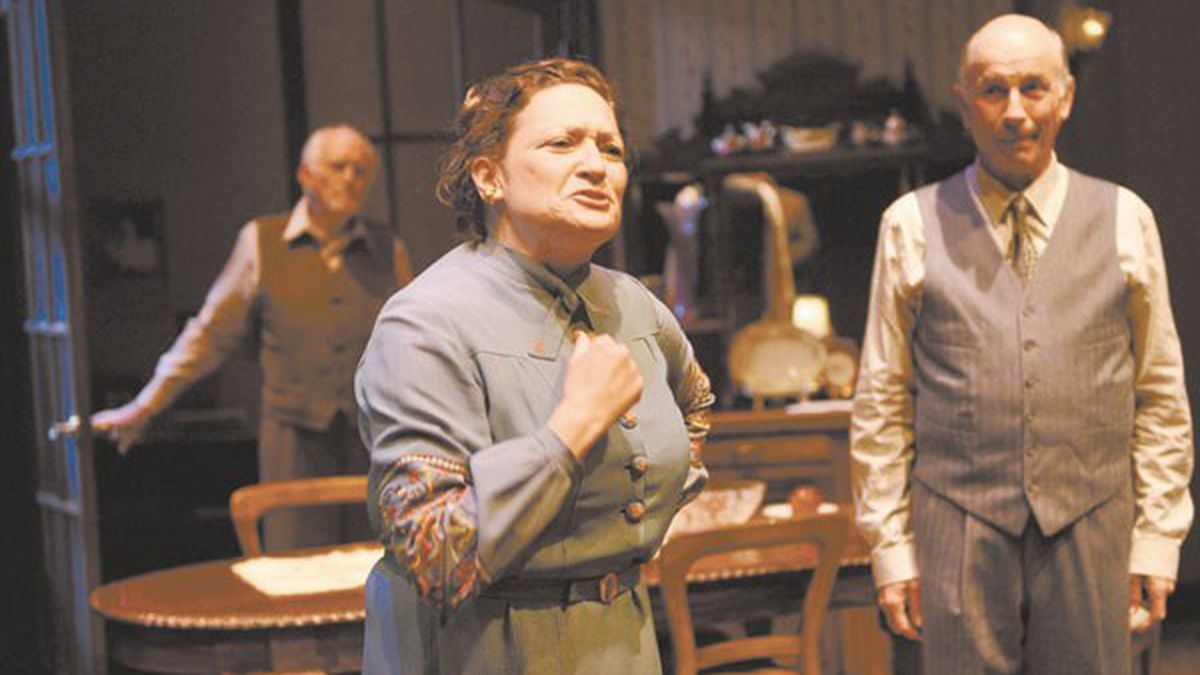Balance is overrated for the Bergers. The same might be said for any
hard-scrabble Jewish family in Depression-era New York, but this one
stands out for its particular concentration of mercurial personalities
and unconstrained passions. The Bergers, who star in Aurora Theatre’s
production of Clifford Odets’ 1935 drama Awake and Sing!, do
everything with gusto, whether it’s eating, sleeping, fighting,
gambling, coveting, volleying insults, shuffling cards, or falling in
love. They make snap decisions, speak in aphorisms, and cross-examine
each other at the dinner table. Thus, they’re the perfect people to set
in a pressure-cooker and watch simmer.
Aurora chose an apt time to mount this decades-old play, given all
the parallels between the Great Depression and our current recession.
Of course, Awake and Sing! is locked in a particular time and
place — the characters play pinochle, reference actor Al Jolson,
sit in armchairs, and read the daily newspaper. Yet all the talk of
rationing and budgeting will resonate with modern audiences, as will
the political spats that pit Marxist grandfather Jacob against rich
Uncle Morty. And there’s nothing like an old fashioned morality tale to
put the current crisis in perspective. All the same, this play is less
a historical allegory than a group character study. It shows what
happens when family members manipulate each other to the point that
their strongest foundation starts to crumble.
Several themes and storylines fold together, but the main one, about
a brusque, calculating matriarch who exploits her children, lends
itself some terrific character roles. At the helm is Bessie Berger
(Ellen Ratner), a regal, middle-aged woman with tight curls and a sharp
Brooklyn accent. She’s the type of mother who intercepts phone calls
and sabotages relationships that don’t promise financial returns, but
would marry her children off in a second if it seemed practical. Her
husband Myron (Charles Dean) is a spineless layabout. Her father Jacob
(Ray Reinhardt), the play’s resident moral compass, is constantly
quoting socialist philosophers while playing opera at full blast. Her
daughter Hennie (Rebecca White) is a cranky, irresponsible broad with a
bad habit of following her own desires. Her son Ralph (Patrick Russell)
is a self-pitying do-gooder with imprudent romantic interests. Hennie’s
lover Moe Axelrod (Rod Gnapp) is a racketeer who gets under everyone’s
skin. If only Bessie could make them all behave.
Bessie is the fulcrum around which spins all the play’s action. She
denies Ralph the money for proper dental care or new skates, so he
grows up without any sense of familial loyalty. She finds out Hennie is
pregnant out of wedlock and forces her into a marriage of convenience
with the family’s schlubby neighbor, Sam Feinschreiber (Anthony
Nemirovsky). Like any good despot, Bessie knows how to lie with a
straight face, sweep things under the rug, and get other people to do
her bidding. But she falls apart under scrutiny. It took great
concentration on Ratner’s part to make Bessie a believable, even
endearing character. She belittles people but also covers for her
children when they make a mess. She’s cruel, yet put-upon.
Ratner is dazzling, and she’s in good company. Gnapp plays Moe
Axelrod as a wise-cracking hustler who’s so encumbered by his peg leg
that it seems one whole side of his body is disfigured. He’s a bit
slimy for no-nonsense Hennie, but manages to seduce her anyway —
probably thanks to slim pickins’ in the Berger orbit. Victor Talmadge
is also convincing as the self-made uncle who subjects other characters
to his discretionary largesse. He’s as ornery as the others, dispensing
such pearls as “Common sense is thicker than love” (which befits more
than one relationship in this family). When Morty finds out that
Axelrod has three wooden legs stowed away for safekeeping, he decides
that if Uncle Sam would stop giving out legs, “maybe we could balance
the budget.”
The actors benefit hugely from Odets’ script, which is a lot smarter
and funnier than the phrase “Depression-era family drama” would lead
you to believe. But it’s surely quite difficult to inhabit one of these
roles. Director Joy Carlin has a penchant for intricate blocking, and
often has two planes of action happening simultaneously onstage. For
instance, she sets up a family dinner scene in the background while
Ralph comes to the fore to act out a private phone conversation with
his girlfriend. (The phone conversation is hard to do even without the
added clamor of dinner because Ralph has to convey what’s happening on
the other end.) It’s a cool trick that makes the whole play seem more
layered and complex, even though it requires everyone to be fully “on”
at all times.
In fact, Awake and Sing! does have several layers to it,
story-wise and theme-wise. The dialogue is sharp and peppery, and the
characters constantly lie to one another and leave it up to the
audience to sort fact from fiction. Moreover, the line between moral,
ethical behavior and evil subterfuge is perilously thin. For a play
that’s ostensibly about poverty and desperation, it’s actually quite
rich.













